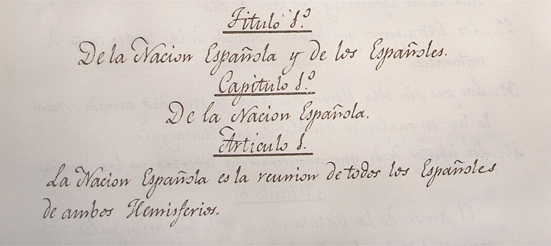About us
The group of investigation on Cultural and Institutional History of the Constitucionalismo in Spain was based in 1996 in a traumatic situation for his components. Francisco Tomás y Valiente had been assassinated by terrorist band ETA. Who we collaborated with him in the university work we felt literally neglected. Some of us from the Universities of Seville and Madrid, the majority disciples his of first or second generation, we became the dream impossible to create a Tomás and Valiente collective. Thus the group was born and thus, by the referred impossibility, it is as it undertook its own course.
On the name that it identified to us we reflected yet well-taken care of. We knew clearly that, like group, we wanted to concentrate in constitutional history and more particularly in the Spanish, penetrating in the Old Regime to the exclusive intentions to locate and to reconstruct its scene of starting, but also we had more clear that we did not want to be reduced to the type of still predominant constitutional history, the one that practically takes care only of political institutions or often of policy immediately. We either did not want to shut in of exclusive form in Spain. To all this they respond the shades of our collective name.
We put in front cultural to institutional understanding that the constitucionalismo generally is first of all a variant of formed legal culture in a system of right of character legal than politician with deep roots in European history. We despised the history of the institutions, neither of the civilians nor of the policies, but we tried to approach it from this certainty of the past existence of a legal the more jurisdictional system that legalistic, the more employee therefore of a certain social culture that of concrete political powers. It is the reason by that we announced Cultural and Institutional History, by that precise order. And we added of the Constitucionalismo in non Spanish Spain and or of Spain to understand that the constitutional culture overflows opposite or, this of another form, is not let shut in, against the conventional treatment of said another constitutional history, in maps of States. It is necessary to explain that, if we added in Spain to our own denomination, it is to understand that the national demarcations are in any case from most excellent?
The group has come extending itself from 1996 in a felt double, the one of its composition and the one of its object. Since then people of other Universities have gotten up themselves, like the one of the Basque Country and the one of Salamanca. Lately companions of America have begun to integrate themselves, responding this to the second species of extension, the one of the object. In a first period, we concentrated ourselves in the Spanish scene between half-full of century XVIII and 1837, which substantially meant in the period of formation of the legal culture that acquired body in the Constitution of Cadiz and during the time of life of the same. Cadiz took to America not only because until extended there, but also because immediately we verified that good part of the gaditana constitutional work is incomprehensible if is not taken in due counts the circumstance that this Constitution was not made far from it only for present Spain.
Every time we moved away more of the usual parameters of Spanish constitutional history. On the other hand, also we have come extending the chronological arc, first until 1876 and soon to all the century XIX.
Our not confessed ambition is, by all means, to arrive at the present time. We will not live for such a long time, the group also
has been concerned about the training of new staff researcher.
Subsidized proyects:
- Historia Cultural e Institucional del Constitucionalismo en España, siglo XVIII-1837.
Entidad financiadora: DGICYT.
Proyecto PB96-1333.
1997-2000.
- Historia Cultural e Institucional del Constitucionalismo en España, siglo XVIII-1876., siglo XVIII-1837.
Entidad financiadora: DGESIC.
Proyecto BJU2000-1378.
2000-2003.
- Historia Cultural e Institucional del Constitucionalismo en España y América, siglos XVIII y XIX.
Entidad financiadora: DGESIC.
Proyecto SEJ2004-06696-C02-01.
2004-2007.
- Historia Cultural e Institucional del Constitucionalismo en España y América, siglos XVIII y XIX.
Entidad financiadora: DGESIC.
Proyecto SEJ2007-66448-C02-01/Juri.
2007-2009.


